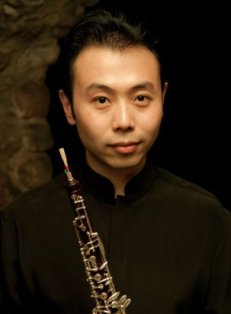
Woodwinds in Their Glory

Liang Wang
|
Woodwinds were front and center on the second night of the 2011 Constella Festival Oct. 14 in Fifth Third Bank Theater at the Aronoff Center for the Arts.
Especially the oboe. Special guest – and the reason the concert was entitled “Cincinnati Connections” – was Liang Wang, principal oboist of the New York Philharmonic Orchestra. Liang Wang held the same position in the Cincinnati Symphony Orchestra in 2005-2006. Joining him on this Constella concert were violinist Anna Reider , double bassist Matthew Zory and flutist Jasmine Choi, all former CSO colleagues, and his successor as CSO principal oboist, Dwight Parry.
To bestow special ambience, the concert was candlelit, at least partly. The aisles were lined with luminaria (electric tea lights in paper bags), which provided a warm glow. The performers’ space was lit by ceiling lights. The theater was full for the performance. Some people (including the writer) were due at the Cincinnati Symphony later in the evening and had to leave early (this applied to the above CSO players, as well, but depending on their position on the program, all were in their seats at Music Hall on time.)
The concert opened with a composer closely identified with the oboe, Tomaso Albinoni (1671-1751). A Venetian, Albinoni was quite fond of the instrument and wrote some of the earliest concertos for it (although he apparently did not write the well known Albinoni Adagio). To hear his Concerto Op. 9, No. 9 performed by two of the world’s finest oboists (Liang Wang and Parry) was a rare treat. The two instruments were heard together almost all the time. This produced a glorious sound, made all the more impressive by the complex interweaving of lines. It was equally rewarding to hear them take turns accompanying each other in the lovely Adagio. Performing with them were violinists Reider and Tatiana Berman (Constella founder and artistic director), violist Yael Senamaud-Cohen, cellist Nathaniel Chaitkin and bassist Zory.
Amy Beach’s Theme and Variations for Flute and String Quartet, Op. 80, followed. Having first heard it at a German manor house in Estonia, I was especially delighted to hear it again. Beach (1867-1944), a member of the Second New England School of composers, was the first American woman to win recognition as a composer of classical music. She wrote in the romantic idiom of her day, though you can hear her stretching its bounds. (Gustav Mahler comes to mind in some of the lush, complex harmonies of this Quartet.)
Choi was the flutist, joined by Berman and Reider, Senamaud-Cohen and Chaitkin. The quartet announced the tender theme, from Beach’s own song, “An Indian Lullaby.” Choi entered in the first variation, soaring over the strings in quasi-improvisatory fashion. Chaitkin’s cello lit up the fifth and longest variation, a heartfelt one marked con grand espressione. The finale began with a fugue and the Quartet came full circle again with a repeat of the flute’s opening passage from the first variation.
With only one movement of Mozart’s Oboe Quartet in F Major, K.370 – a particularly gracious and melodious one featuring Liang Wang, Reider, Senamaud-Cohen and Chaitkin -- I had to decamp for Music Hall and the CSO (with regret for the rest of the Mozart Quartet and Matthew Arnold’s Oboe Quartet, Op. 61 with Liang Wang, Berman, Senamaud-Cohen and Chaitkin).